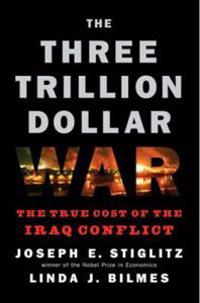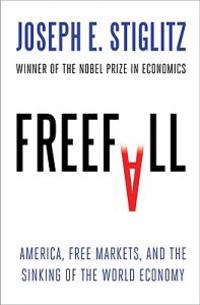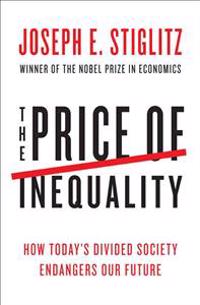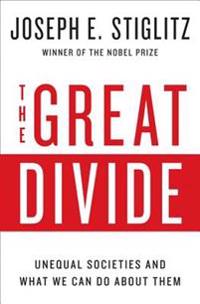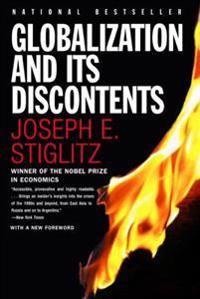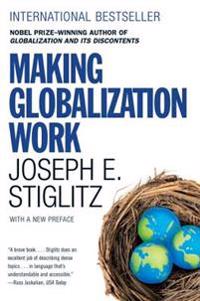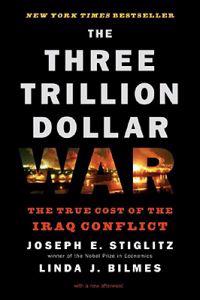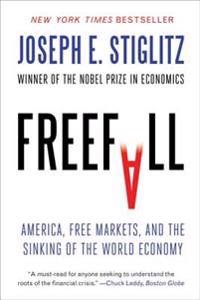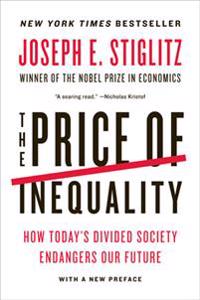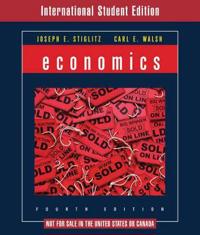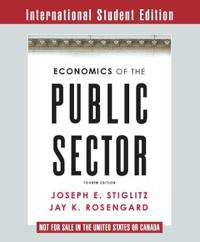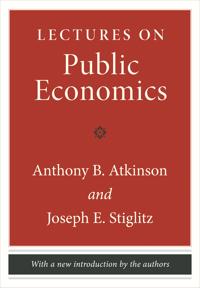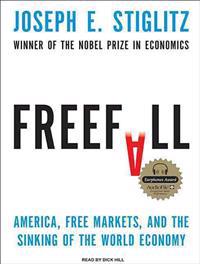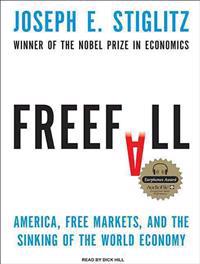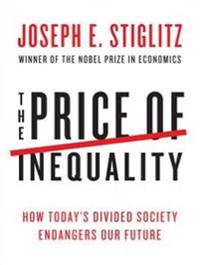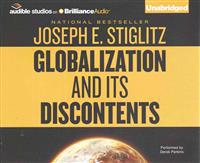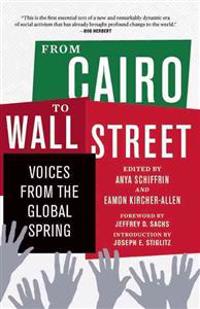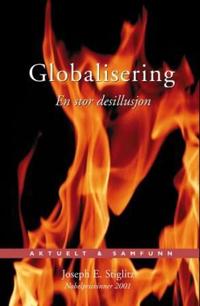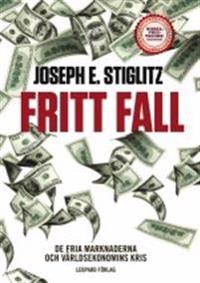The Three Trillion Dollar War (Inbunden)
avJoseph E. Stiglitz, Linda J. Bilmes
ISBN: 9780393067019 - UTGIVEN: 200802Reveals massive expenses associated with the Iraq War, including military equipment, veteran care, and Middle East restructuring projects, in a cautionary account that evaluates the war's long-term costs, both financial and human, as well as their consequences to taxpayers.[...]
Freefall (Inbunden)
avJoseph E. Stiglitz
ISBN: 9780393075960 - UTGIVEN: 201001The Great Recession, as it has come to be called, has impacted more people worldwide than any crisis since the Great Depression. Flawed government policy and unscrupulous personal and corporate behavior in the United States created the current financial meltdown, which was exported across the globe [...]
The Price of Inequality (Inbunden)
avJoseph E. Stiglitz
ISBN: 9780393088694 - UTGIVEN: 201206The top 1 percent of Americans control 40 percent of the nation's wealth. And, as Joseph E. Stiglitz explains, while those at the top enjoy the best health care, education, and benefits of wealth, they fail to realize that "their fate is bound up with how the other 99 percent live." Stiglitz draws o[...]
The Great Divide (Inbunden)
avJoseph E. Stiglitz
ISBN: 9780393248579 - UTGIVEN: 2015-04A singular voice of reason in an era defined by bitter politics and economic uncertainty, Joseph E. Stiglitz has time and again diagnosed America's greatest economic challenges, from the Great Recession and its feeble recovery to the yawning gap between the rich and the poor. The Great Divide gather[...]
Globalization and Its Discontents (Häftad)
avJoseph E. Stiglitz
ISBN: 9780393324396 - UTGIVEN: 200304An insider's analysis of the major institutions of globalization, this title details Joseph E. Stiglitz's disillusionment with the International Monetary Fund and other major institutions as they put the interests of Wall Street and the financial community ahead of the poorer nations.[...]
The Roaring Nineties (Pocket)
avJoseph E. Stiglitz
ISBN: 9780393326185 - UTGIVEN: 2004-10With his best-selling "Globalization and Its Discontents," Joseph E. Stiglitz showed how a misplaced faith in free-market ideology led to many of the recent problems suffered by the developing nations. Here he turns the same light on the United States. "The Roaring Nineties" offers not only an insid[...]
Making Globalization Work (Häftad)
avJoseph E. Stiglitz
ISBN: 9780393330281 - UTGIVEN: 200709Four years after he outlined the challenges our increasingly interdependent world was facing in Globalization and Its Discontents, Joseph E. Stiglitz offered his agenda for reform. Now in paperback, Making Globalization Work offers inventive solutions to a host of problems, including the indebtednes[...]
The Three Trillion Dollar War: The True Cost of the Iraq Conflict (Häftad)
avJoseph E. Stiglitz, Linda J. Bilmes
ISBN: 9780393334173 - UTGIVEN: 200809America has already spent close to a trillion dollars on the wars in Iraq and Afghanistan, but there are hundreds of billions of bills still due--including staggering costs to take care of the thousands of injured veterans, providing them with disability benefits and health care. In this sobering st[...]
Freefall (Pocket)
avJoseph E. Stiglitz
ISBN: 9780393338959 - UTGIVEN: 201010The Great Recession, as it has come to be called, has impacted more people worldwide than any crisis since the Great Depression. Flawed government policy and unscrupulous personal and corporate behavior in the United States created the current financial meltdown, which was exported across the globe [...]
The Price of Inequality (Häftad)
avJoseph E. Stiglitz
ISBN: 9780393345063 - UTGIVEN: 201303America currently has the most inequality, and the least equality of opportunity, among the advanced countries. While market forces play a role in this stark picture, politics has shaped those market forces. In this best-selling book, Nobel Prize-winning economist Joseph E. Stiglitz exposes the effo[...]
Economics of the Public Sector (Häftad)
avJoseph E. Stiglitz
ISBN: 9780393937091 - UTGIVEN: 2015-04What should be the role of government in society? How should it design its programs? How should tax systems be designed to promote both efficiency and fairness? Nobel Laureate Joseph Stiglitz and new co-author Jay Rosengard use their first-hand policy-advising experience to address these key issues [...]
Economics of the Public Sector (Inbunden)
avJoseph E. Stiglitz
ISBN: 9780393966510 - UTGIVEN: 200002Professor Stiglitz builds on the book s classic strengths: an integrated approach to public economics, a readable and inviting style, and careful attention to real-world problems and applications.[...]
Lectures on Public Economics (Inbunden)
avAnthony B. Atkinson, Joseph E. Stiglitz, Anthony B. Atkinson
ISBN: 9780691166414 - UTGIVEN: 2015-05This classic introduction to public finance remains the best advanced-level textbook on the subject ever written. First published in 1980, Lectures on Public Economics still tops reading lists at many leading universities despite the fact that the book has been out of print for years. This new editi[...]
Introductory Macroeconomics 1E + iStudy (Häftad)
avJoseph E. Stiglitz, Carl E. Walsh, Ross Guest, Max Tani
ISBN: 9780730315513 - UTGIVEN: 2014-11-30Introductory Microeconomics, 1st Australian Edition (Häftad)
avJoseph E. Stiglitz, Carl E. Walsh, Jeffrey Gow, Richmond
ISBN: 9780730315520 - UTGIVEN: 2014-11-30Principles of Economics (Pocket)
avJoseph E. Stiglitz, Carl E. Walsh, Jeffrey Gow, William Richmond, Max Tani, Wiley Australia
ISBN: 9780730319856 - UTGIVEN: 2015-07-03Freefall: America, Free Markets, and the Sinking of the World Economy (CD-bok)
avJoseph E. Stiglitz
ISBN: 9781400115365 - UTGIVEN: 2010-01The current global financial crisis carries a "made in America" label. In this forthright and incisive book, Nobel Laureate Joseph E. Stiglitz explains how America exported bad economics, bad policies, and bad behavior to the rest of the world, only to cobble together a haphazard and ineffective res[...]
Freefall: America, Free Markets, and the Sinking of the World Economy (Övrigt)
avJoseph E. Stiglitz
ISBN: 9781400165360 - UTGIVEN: 201001The current global financial crisis carries a "made in America" label. In this forthright and incisive book, Nobel Laureate Joseph E. Stiglitz explains how America exported bad economics, bad policies, and bad behavior to the rest of the world, only to cobble together a haphazard and ineffective res[...]
The Price of Inequality: How Today's Divided Society Endangers Our Future (Övrigt)
avJoseph E. Stiglitz
ISBN: 9781452658179 - UTGIVEN: 2012-06The top 1 percent of Americans control 40 percent of the nation's wealth. And, as Joseph E. Stiglitz explains, while those at the top enjoy the best health care, education, and benefits of wealth, they fail to realize that "their fate is bound up with how the other 99 percent live."
Stiglitz dra[...]Globalization and Its Discontents (CD-bok)
avJoseph E. Stiglitz
ISBN: 9781491528754 - UTGIVEN: 2015-01This powerful, unsettling audiobook gives us a rare glimpse behind the closed doors of global financial institutions by the winner of the 2001 Nobel Prize in Economics. When it was first published, this national bestseller quickly became a touchstone in the globalization debate. Renowned economist a[...]
From Cairo to Wall Street: Voices from the Global Spring (Häftad)
avJoseph E. Stiglitz, Anya Schiffrin, Eamon Kircher-Allen
ISBN: 9781595588272 - UTGIVEN: 2012-05Globalisering; en stor desillusjon (Inbunden)
avJoseph E. Stiglitz
ISBN: 9788278220726 - UTGIVEN: 2002Dette er en helt vesentlig bok for alle dem som gjerne vil ha dypere innsikt i globaliseringsprosessen og hvorfor den er urettferdig og mislykket.âGlobaliseringen i dag fungerer ikke. Den fungerer ikke for mange av verdens fattige. Den fungerer ikke for mye av miljøet. Den fungerer ikke for st[...]
Globaliseringen och dess kritiker (Inbunden)
avJoseph E. Stiglitz
ISBN: 9789173430340 - UTGIVEN: 2003111900-talets sista årtionde var fyllt med dramatik. Sovjetunionens sammanbrott och övergången till marknadsekonomi i Ryssland och andra länder i Östeuropa hade påbörjats. Finansmarknaderna skakades av kriserna i Latinamerika och Asien. Under ytan växte kritiken mot Världsbankens, WTO:s och I[...]
Fritt fall : de fria marknaderna och världsekonomins kris (Inbunden)
avJoseph E. Stiglitz
ISBN: 9789173432948 - UTGIVEN: 201101VÄRLDSEKONOMINS KRIS
När den ekonomiska krisen bröt ut 2008 miste miljontals människor över hela världen sina hem och arbete. Den kris som började i USA blev snabbt global och drabbade de fattiga länderna och folken extra hårt.
Joseph E. Stiglitz analyserar orsakerna b[...]

